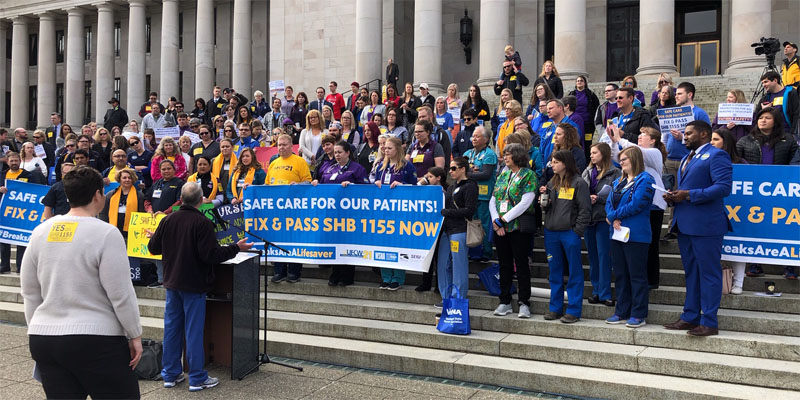STATE GOVERNMENT
2019 Leg. Report: ‘A pivotal year for state politics and policy’
WSLC 2019 Legislative Report summarizes session, how each legislator voted
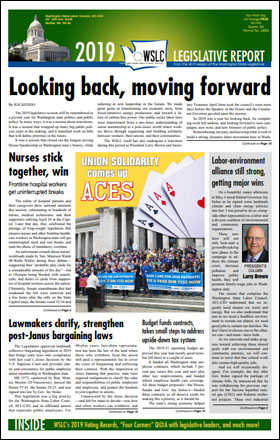 OLYMPIA (July 18, 2019) — The Washington State Labor Council, AFL-CIO has published its 2019 Legislative Report summarizing this year’s session of the State Legislature, describing how bills on working family issues fared, and scoring all legislators on how they voted.
OLYMPIA (July 18, 2019) — The Washington State Labor Council, AFL-CIO has published its 2019 Legislative Report summarizing this year’s session of the State Legislature, describing how bills on working family issues fared, and scoring all legislators on how they voted.
Download the full 10-page report (PDF) or just the 2019 WSLC Voting Record.
Printed copies of the 2019 Legislative Report will be distributed at next week’s WSLC Convention and mailed to all WSLC-affiliated unions. Officers, staff, and rank-and-file members of affiliated unions also can request additional copies or call 206-281-8901 to order multiple copies.
Here is the report’s session overview:
By JOE KENDO
From the WSLC 2019 Legislative Report
The 2019 legislative session will be remembered as a pivotal year for Washington state politics and public policy. In many ways, it was a session about transitions. It was a session that wrapped up many big public policies years in the making, and it launched work on bills that will define priorities in the future.
It was a session that closed out the longest serving House Speakership in Washington state’s history, while ushering in new leadership in the Senate. We made great gains in transitioning our economy away from fossil-intensive energy production, and toward a future of carbon-free power. Our public sector labor laws were transitioned from a pre-Janus understanding of union membership to a post-Janus world where workers thrive through organizing and building solidarity between workers, their unions, and their communities.
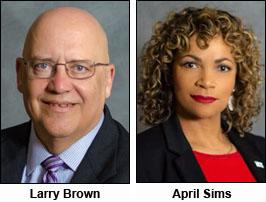 The WSLC itself has also undergone a transition during this period as President Larry Brown and Secretary Treasurer April Sims took the council’s reins mere days before the Speaker of the House and the Lieutenant Governor gaveled open the session.
The WSLC itself has also undergone a transition during this period as President Larry Brown and Secretary Treasurer April Sims took the council’s reins mere days before the Speaker of the House and the Lieutenant Governor gaveled open the session.
So 2019 was a year for looking back, for completing work left undone, and looking forward to new campaigns, new wins, and new frontiers of public policy.
Remembering our past, and knowing what it took to build a strong, dynamic labor movement here in Washington state, our unions came together to strengthen the bonds of solidarity. We worked together in ways we have failed to do in recent years to ensure the realization of long-fought campaigns for workers’ rights and on-the-job protections.
Teachers, Sheet Metal Workers, Operating Engineers, Teamsters, City and County Employees, and many others joined Nurses, Surgical Technicians, and other healthcare workers to secure functional access to basic meal and rest breaks, and to secure protections from abusive overtime practices.
Looking forward, Electricians, Nurses, Grocery and Retail Workers, Laborers, Pipefitters, and Public Employees worked together to help deliver a 100% Clean Energy mandate. It will usher Washington state into an era of climate justice, while promoting renewable energy development that will be built by workers earning area-appropriate wages, with apprenticeship hours, with opportunities for women and minority owned businesses, and with project labor agreements.
In an effort to right past wrongs, and to secure justice for workers today and tomorrow, our unions and community allies secured laws to make our economy more just:
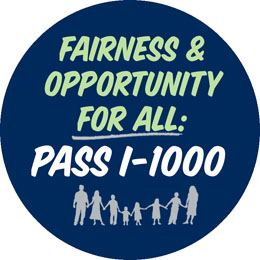 ● The WSLC-endorsed Initiative 1000 was approved, which will end the state’s I-200 ban on affirmative action programs that provide equal opportunity in education, employment and contracting.
● The WSLC-endorsed Initiative 1000 was approved, which will end the state’s I-200 ban on affirmative action programs that provide equal opportunity in education, employment and contracting.
● Wrongful death statutes were fixed to ensure that the families of people killed could find justice, no matter their national origin, or the age of their lost loved ones.
● The regulation of outrageous non-competition contracts will ensure that workers are actually allowed to seek better job opportunities in their fields.
● The passage of the Keep Washington Working law will provide more protections to the immigrant workforce that all too often goes unacknowledged in our rural communities.
These kinds of laws will help members of our communities better balance the scales of justice which have, for too long, tilted in favor of more powerful interests.
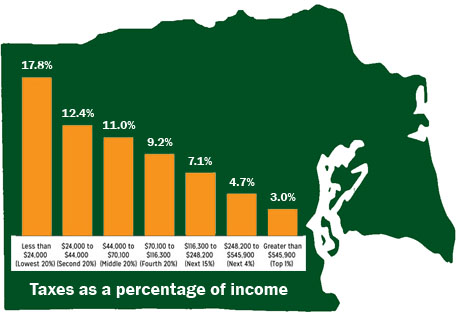 But there is still much to do. Our tax code remains upside-down and backward, relying too much on lower-income and middle-class families spending more of their paycheck to support our communities’ public investments than the wealthiest in our state.
But there is still much to do. Our tax code remains upside-down and backward, relying too much on lower-income and middle-class families spending more of their paycheck to support our communities’ public investments than the wealthiest in our state.
However, small progress was made by increasing taxes on out-of-state banks and shifting certain real estate taxes from affordable homes to more luxurious houses. We should celebrate these achievements, but not forget that unearned profits from the sale of stocks and bonds are untaxed in Washington state, home of the two wealthiest people on the planet, and the two wealthiest corporations that fuel their extraordinary riches.
And thousands of workers in our state remain unorganized despite desperately wanting a union on the job. In both the public and private sector, our labor laws fail to recognize the inherent rights of these workers either by not explicitly granting them for certain state employees, or by allowing private corporations to misclassify workers as independent contractors without consequence. We must do more to ensure that all workers have the ability to come together to secure dignity, a voice, and a living wage while on the job.
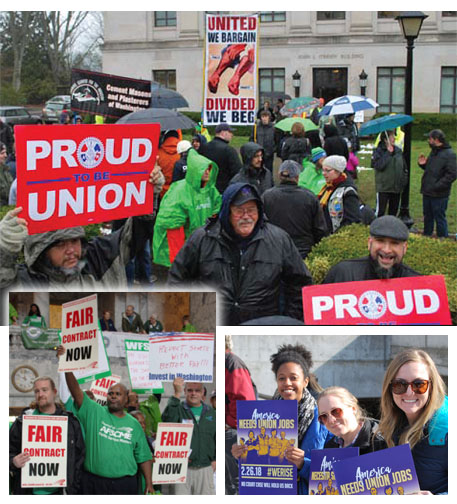 Washington should also look to the laws that protect workers’ wages, health benefits, safety, and social insurance which have underpinned the middle-class for generations, and look forward to new ways to enforce those laws in light of new business profit-models predicated on avoiding those protections. Our state must also continue to focus on the existential threat posed by climate change, and pursue actions to defeat it that strengthen our economy, our families, and our unions. Fighting climate change and income inequality should be the same fight, and the solutions to one problem should lend themselves to solving the other.
Washington should also look to the laws that protect workers’ wages, health benefits, safety, and social insurance which have underpinned the middle-class for generations, and look forward to new ways to enforce those laws in light of new business profit-models predicated on avoiding those protections. Our state must also continue to focus on the existential threat posed by climate change, and pursue actions to defeat it that strengthen our economy, our families, and our unions. Fighting climate change and income inequality should be the same fight, and the solutions to one problem should lend themselves to solving the other.
I am extremely proud to have the opportunity to do the work that I do on behalf of the hundreds of thousands of union members across Washington state. Our work is exhausting and it never seems to end, but when we do it together it nourishes our fighting spirit, and the victories we secure refresh our hearts.
As members of Washington’s vibrant labor community, you have much to be proud of. These victories are your victories, won by your fights, lead by your leaders, and secured by your unions.
Joe Kendo is Government Affairs Director of the Washington State Labor Council, AFL-CIO.
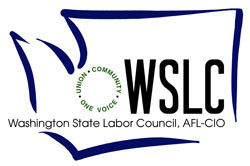 The WSLC 2019 Legislative Report includes many more articles on rest breaks for nurses and frontline caregivers, post-Janus collective bargaining laws, the state’s biennial budget, non-competition contracts, protecting immigrant workers, the new long-term care public benefit, building trades issues, and much more. Download the full 10-page PDF to read them all, or request the printed edition or call 206-281-8901 to order multiple copies.
The WSLC 2019 Legislative Report includes many more articles on rest breaks for nurses and frontline caregivers, post-Janus collective bargaining laws, the state’s biennial budget, non-competition contracts, protecting immigrant workers, the new long-term care public benefit, building trades issues, and much more. Download the full 10-page PDF to read them all, or request the printed edition or call 206-281-8901 to order multiple copies.
The WSLC is the largest union organization in Washington state, representing the interests of more than 600 local unions and councils with approximately 550,000 rank-and-file members. For more information, visit www.wslc.org.

